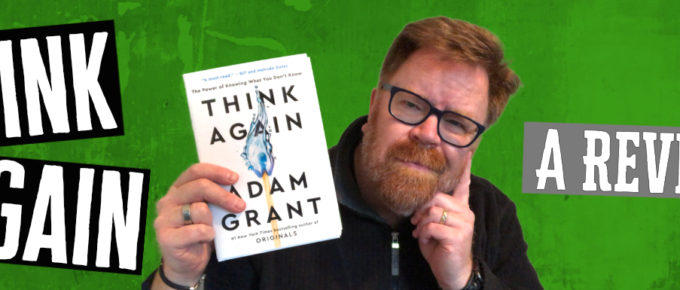How do we make a difference in the world? In particular, how do we make a difference in the face of adversity? These are difficult questions to ask at the best of times. They are especially challenging questions to ask right now. The world is a scary place that feels like it is getting scarier. It is easy to despair of it all, to want to give up and withdraw and make it all go away. Figuring out what to do instead is hard. One path forward comes from the intriguing intersection of ideas shared by a writer, an admiral and a psychologist (not the punchline for a joke).
Blog
Live Review: Think Again
Join me as I review Adam Grant’s “Think Again.” How do you change your mind? How do you let go of what you think you know, and relearn what is more helpful and relevant?
Join me on 11 May 2022 at 1:00pm EDT on LinkedIn Live!
Trust But Verify
One of the enduring phrases my father taught me is “trust, but verify.” It is not one that I use myself very often. But it is one that I think about a great deal. Within those three simple words is a great deal of complexity, and an opportunity for a profound amount of insight. It is a phrase that can also be misused: we can be overly intrusive in our approach, but we can also be neglectful. The challenge, as always is finding balance. How much can you trust? And how much do you need to verify?
Next Webinar: Structure in Three Acts
There is a universal structure that underlies almost all of human functioning. Masters of their craft value it. Others ignore it at their peril. It is enormously simple, and yet incredibly complex. The three-act structure is the anchor that guides almost every meaningful interaction we encounter. Why does it work the way it does? Where does its power come from? Most importantly, how do you apply meaningfully?
Cracks Around the Liminal Edges of Re-entry
We crossed the threshold of two years with the pandemic just a few days ago. We all entered into this liminal experience together, unequal though that still was. Two years on, we are not all leaving it together. There are more than cracks around the edges, and our personal experiences are fragments of a shattered whole. For those still trying to navigate through to the other side, there are insights that liminality has to offer, and perspectives to manage wrestling with the complex question of, “What’s next?”
Wrestling With Complexity
Most of us are not fans of complexity. We may like to tackle difficult challenges as part of our work. But the closer that complexity comes to home, the less comfortable and confident that we feel. The natural reaction to that is to exert control. We try to impose structure and manage work and force our way through to the finish line. Research and experience have shown—time and time again—that this is more often than not a recipe for failure. That is not to say that there aren’t strategies to navigate complexity. They are just different than our normal impulses suggest.






